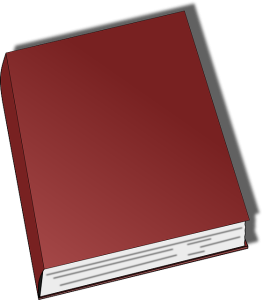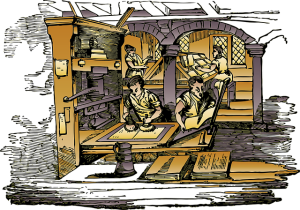You know my dog writes more than me, yes, I’m serious. He seems to have constant fun at it too. He keeps making ruff drafts and never gets a publisher. Talk about enjoying one’s life purpose naturally!
I wonder what a bear needs to do to get published with Penguin. What if it only catches the seal of approbation? I mean Penguin isn’t exactly open … they’re just black and white.
Okay, let’s move on from penguins, seals, and dogs to human beings wanting to know about different types of publishers.
This article will have you identify the types of publishers out there to help you choose your publishing journey. Not all publishing contracts and offers to publish are what they seem.
 1) Self-publishing
1) Self-publishing
This has become by far the most popular route for authors due to the level of risk publishing companies are willing to take on books. There are many platforms where an author can self-publish today and sell their books online. Here are just a few places on the top of my head where one can self-publish.
Amazon – https://kdp.amazon.com/en_US/
Lulu – https://www.lulu.com/
Kobo – https://kobowritinglife.com/
Feedaread – https://www.feedaread.com/
With the self-publishing journey, the author undertakes the full cost and control over their book and design with the help and support of self-publishing services. The author can have their book covers designed or use the self-publishing platform with standard design options available for their book.
A step-by-step process takes the author through choosing the cover, uploading it and the content, via a standardised format required by each platform, and having the standard printing information on all books that are being self-published through the platform. Each platform is usually transparent on royalty payments along with the percentage the platform takes from authors on book sales.
When it comes to self-publishing it is up to the author to market their book, ultimately the success of the book depends highly on the efforts of the author.
2) Vanity publishers
The advice I will give with regards to vanity publishers is based much on my own experience, but this may not necessarily be the same experience for you. It’s almost coming from been there done that and not ever again when it comes to Vanity publishers for me, however, a debut author who just plans to write that one book or two won’t see this as a potential danger especially if writing and publishing isn’t somewhat something they’re planning to do for life or work.
Vanity publishers will most definitely charge an author and provide a part publishing contract which in the end the author ends up doing the most work even after paying the Vanity publisher. Here the author is restricted, and even to some extent if the small print isn’t read their rights to their work can be at risk (their rights) or to the extent they wish to market or have rights to some elements of the publishing journey right through to marketing. Vanity publishers make their money off the authors’ ideas to be published by a publisher which comes at a cost to the author with not a lot of freedom to choose. With an agreement in place via a contract it is the Vanity publisher that holds most of the cards in its hands. Here is more on the Dangers of vanity publishers. Traditional publishers do not ask the author for any investment and have more monetary resources of their own to push the book/s further out into the market.
3) Traditional publishers
I mean let’s face it, this is everyone’s dream to get an offer or contract, I mean a legitimate offer. Often traditional publishers offer an advance on the royalties. To get a traditional publishing contract means this. Traditional publishers have years of network and contacts within the industry from knowing the top agents, to the wholesalers, bookshops, libraries and schools, etc. Over recent years traditional publishers have become strict on advances, royalties and pay-out to authors.
Often an author would submit their proposal to traditional publishers. Traditional publishers offer submissions and deadlines for submissions. They contact those who they see potential in and request the manuscript following a process until offering a publishing contract. Traditional publishers take a small number of manuscripts and make their money off the sale of books. They do not ask the author to pay any costs apart from the agreed royalties which were/are stipulated in the contract/agreement. Traditional publishers are highly selective.
 4) Hybrid publishers
4) Hybrid publishers
I haven’t come across many hybrid publishers in my time as I went through the different types of publishers when I finished my first novel The South African: True Colours; however, they are selective in what they publish but not as selective as traditional publishers. Hybrid publishes are all for the book and its release meaning they make their money off the royalties, but how the book comes into the market can mean that the author also funds this. These publishers do take risks on new writers, but they also retain the rights of the material and creativity with some rights to the author.
5) Academic publishers and textbook publishers
This is not usually seen as a category in the different types of publishers. Some authors create exercise books or textbooks for schools. Some have gone from entertainment to study which is present in the works of every school today, such as Shakespeare, William Wordsworth, Lord Byron, and some local books for every country. These books fit in certain age groups depending on how high the level of study is.
Today with self-publishing or with any publisher electronic books tend to be on the agenda as part of technology and advancement with the market as a cheaper and better option for various reasons compared to print books even schools use technology today compared to the old pen and paper days.
6) Independent publishers and press
These are publishers that are in a certain niche and are looking to only publish certain topics which they could have possibly built a market for. There are some small independent presses which also take submissions such as Manchester University Press, which is into humanities and social science research. Legend Press is only into fiction publications.
7) Book packages
There are businesses out there that offer book printing and marketing services at separate costs. These costs are divided for the author to select a certain part of the publishing journey that they see they require more support with. These are divided into promotional material, business cards, hardcover copies, paperback or electronic, registrations, ISBNs, etc.
Today with the constant ups and downs in the economy and the crisis we have some press, and publishing houses still standing through the test of time and others just dissolve. New printers, publishers, styles of contracting etc. change with time, it is important to research, look at reviews and know exactly what one is getting into, or the endeavour can become more in “vein” than writing and having one’s book out in itself.
Here are some resources that can help with looking into the different types of publishers so that one can be further equipped with more information while brewing the idea of selecting one’s publishing journey.
Types of book publishing companies
What are the different types of publishers and how do I decide the best publishing option for me
Do you have any view on any other different types of publishers? Drop us a comment.
You know, maybe I should make my next book about ghosts… you just never know… they might fly off the shelves…
Now that would be a great ghost story without any need to market.
You can also have a look at the Different types of publishers short video.
Drop us a comment below and follow us or share this article on Instagram, Tiktok, and Facebook.
In the next article, I will be going into how to start writing a song.
Yours sincerely
T. Dench Patel














